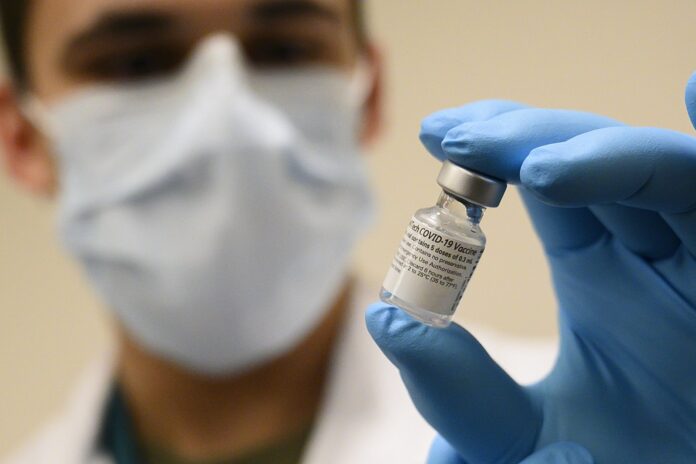Analysis Keith Rankin.

In its pandemic response, the New Zealand government has consistently been tardy, and then found itself playing catch-up, having to ‘go hard’ (indeed a ‘world-leading’ hardest) on account of its lack of preparedness. Further, having gone hard, there has always been an ambivalence about when the emergency period is over; an unwillingness to promptly restore liberties once the ‘hardness’ had either succeeded or failed.
Eventually, the government’s advisers caught on to the idea that vaccination was the way back to a normal, with civil liberties restored for vaccinated people. Yet the government continues to apply an ‘abundance of caution’ – an ambivalence – towards the issue of restoring basic liberties. The result is a China-like ‘vaccination plus fortress’ safety mentality, rather than a ‘vaccination in lieu of fortress’ approach. The important context here is that there are other forces, not health related, that compromise our liberties; in particular there are state-control, market-discipline, kleptocratic, and unempathic ‘race-to-the-bottom’ competitive forces. Public health induced loss of liberty can be a catalyst for these other forces to gain traction. (A useful introduction to the safety versus liberty conundrum is this from RNZ on 27 Oct: Time to change the COVID conversation. The interviewee, California epidemiologist Dr Vinay Prasad, makes a number of important points about the growing social tribalism and its problematic relationship with ‘truth’; and noting that scientists themselves are not immune from the politicisation of science. Indeed, applied scientists [aka ‘technocrats’] in the past have often been quite wrong in their vehemently-held medical and other prescriptions.)
(We acknowledge that vaccine mandates are themselves problematic from a civil liberties viewpoint. But the valid principle here is that there is a hierarchy of civil liberties, and that compulsory Covid19 vaccinations can only be justified as a means to restoring more important liberties. The lose-lose scenario is that we accept the loss of a liberty on this principle, but that the other [more important] liberties are not restored.)
Yet, even in terms of its preferred ‘control-first’ approach, the government remains blinkered about what may be coming. A safety-first approach does not necessarily achieve more safety; defence against one predator is not defence against all predators, let alone all dangers. The government has bullied people in covid-absent places into wearing facemasks on the basis that Covid19 might turn up in the future, when the proper approach is to use such emergency measures when the emergency occurs. Facemask mandates in such communities make their populations more vulnerable, not less vulnerable, to future micropredators.
What is here now is a Covid19 outbreak that will affect people with expired vaccinations as much as people who have never been vaccinated. (Here, ‘expired vaccination status’ means six-months since a person’s most recent vaccination. For whatever reason, the government may adopt a different definition of ‘expired’.) We are seeing new covid outbreaks in Europe at present (just a few weeks behind the current Singapore outbreak; see my Covid19: Latest Outbreaks, 27 Oct), and signs are that case fatality rates, while most likely lower than in the past, will not be ‘trivial’ either. Further, South Korea’s not looking too good; Covid19 is much more problematic there at present than it is in Japan. These countries are facing the problem of ‘expired vaccination status’ just as they enter winter.
In New Zealand, for many of the early high-priority vaccinees (including people in airports and hospitals, and older people), their second vaccine was six-months or more ago. Revaccinating these people now – especially in Auckland – is much more important than bullying unvaccinated people leading remote lives in the outer provinces. (My partner, who works in the multicultural education sector, will be required to mix with adult students from February, just as her vaccination protection expires.)
Indeed, we will need to plan to revaccinate these critical people again (fourth shot) in May 2022. For high-priority contact workers, regular vaccinations will need to be mandated every November and May; November ahead of the high-circulation summer holiday season, and May ahead of winter. The government not only needs to be acting on this urgent requirement, it needs to be seen to be acting on the revaccination issue; and the Fourth Estate needs to be nagging the government on this issue instead of focussing on hapless escapees from present restrictive locations of detention (such as Auckland).
We are also starting to get people – even Professor Michael Baker – warning about the possibility of a problematic return of influenza next winter. The government needs to pick up such issues, rather than pretending them away until the only option is to go very quickly and very hard.
It would be a Civil Liberties step too far to mandate vaccination for a hypothetical flu epidemic – just as it has been a step too far requiring people to wear facemasks to protect themselves against something that is not in their communities. (Firemen wear facemasks to protect themselves from smoke only when there is smoke. Fires are a good analogy for epidemics, noting that the main factor that drives both is the available ‘fuel’.)
What is required is for the Government to announce this Friday (29 Oct) that it will ramp up the influenza vaccination programme for 2022. (In 2021, the influenza vaccination roll-out was actually held back!) And the government needs to clearly announce that influenza vaccinations will be free to all vaccinees.
At present, influenza vaccinations are free to over-65-year-olds. Additionally, some employers – such as my former employer – pay so that their employees can be vaccinated for free. Such ramping up the influenza vaccination programme is prudent insurance. As most of us appreciate, insurance should be taken out before the event, not during the event.
Not only slow to anticipate, also dishonest when reviewing the past
The government relies much on advisers who, like many other people, are invested in maintaining the truthiness of their past advice.
On this matter, the ‘elephant in the room’ is Sweden, a country widely lampooned – including by me – in 2020 for its apparent callous disregard for human life in the face of Covid19; for what seemed to be (and indeed may have been) a ‘money before lives’ approach, an ‘economy-first’ approach.
It is important to note that, if it turns out that Sweden’s ‘callous’ public health approach to Covid19 turns out to have had betters outcomes than other countries’ policy approaches, that doesn’t mean – in the light of available information at the time – that Sweden’s was the best policy approach. The diverse outcomes, that now appear to favour Sweden, were not predictable then. There was some truth in the New Zealand government’s mantra that the best economic outcomes arise from the best public health policy. Yet, there is also growing evidence for the reverse. By putting the economy first, Sweden appears to have (perhaps unwittingly, and not because its economic policies are particularly good) achieved better public health outcomes.
So far, Sweden’s public health statistics for the pandemic period are not the world’s best; but they are among the best for 2021. (While excess deaths in Sweden have been low, unlike New Zealand they have been positive.) But, if we project into the near-future – say to the end of 2022 – then, based on best predictions with today’s information, Sweden is looking like it may attain the world’s best health outcome. (It’s still not too late for New Zealand, however; to achieve that ‘world leading’ objective, New Zealand must prioritise its Covid revaccination programme, and insure against non-covid health risks such as influenza.)
(We should also note that it’s not just a health/economy dichotomy. It’s more a health/liberties/economy trichotomy, noting that none of these three criteria are, from a policy point of view, independent of the other two. Neither mortality rates nor GDP per capita are themselves adequate measures of policy success.)
Narrow-Sightedness and getting Broadsided
Governments are often accused of being short-sighted (myopic). Indeed, frequently we get (as a reason to have a longer gap between elections) the tiresome claim trotted out that governments only govern in the middle year of New Zealand’s three-year electoral cycle. (Thankfully, the United States parliament – Congress – only has a two-year cycle; otherwise the Biden government would be much more hamstrung today.) In times like now it does indeed seem that ‘a week is a long time in politics’.
The bigger problem is professional narrow-sightedness, a problem that has led, in the criminal courts of the western world, to many miscarriages of justice. When people get invested in a hypothesis, they become unwilling to ‘let go’ when new disconfirming information becomes available. In relation to Covid19, the most apparent form of narrow-sightedness is the obsession with one health threat to the detriment of others. (New Zealand’s celebrity of epidemiologists were conspicuously silent during this year’s RSV epidemic which led to many children being hospitalised; to be fair, the problem may have been that too few journalists were asking them questions about RSV.) People who are not broad-sighted easily get broadsided.
I remember renowned economist Deirdre McCloskey being criticised for changing her mind on some matter. In reply, she said that she modified her views when presented with new information that challenged her previous views. “What do you do” she then said rhetorically “when you get new information?”. We are now moving into a pandemic of closed-mindedness, whereby people – sometimes including politicians, bureaucrats, and technocrats – disregard information that doesn’t fit with a viewpoint in which they are invested.
Conclusion
Revaccinate now, and again in May.
Keith Rankin (keith at rankin dot nz), trained as an economic historian, is a retired lecturer in Economics and Statistics. He lives in Auckland, New Zealand.








